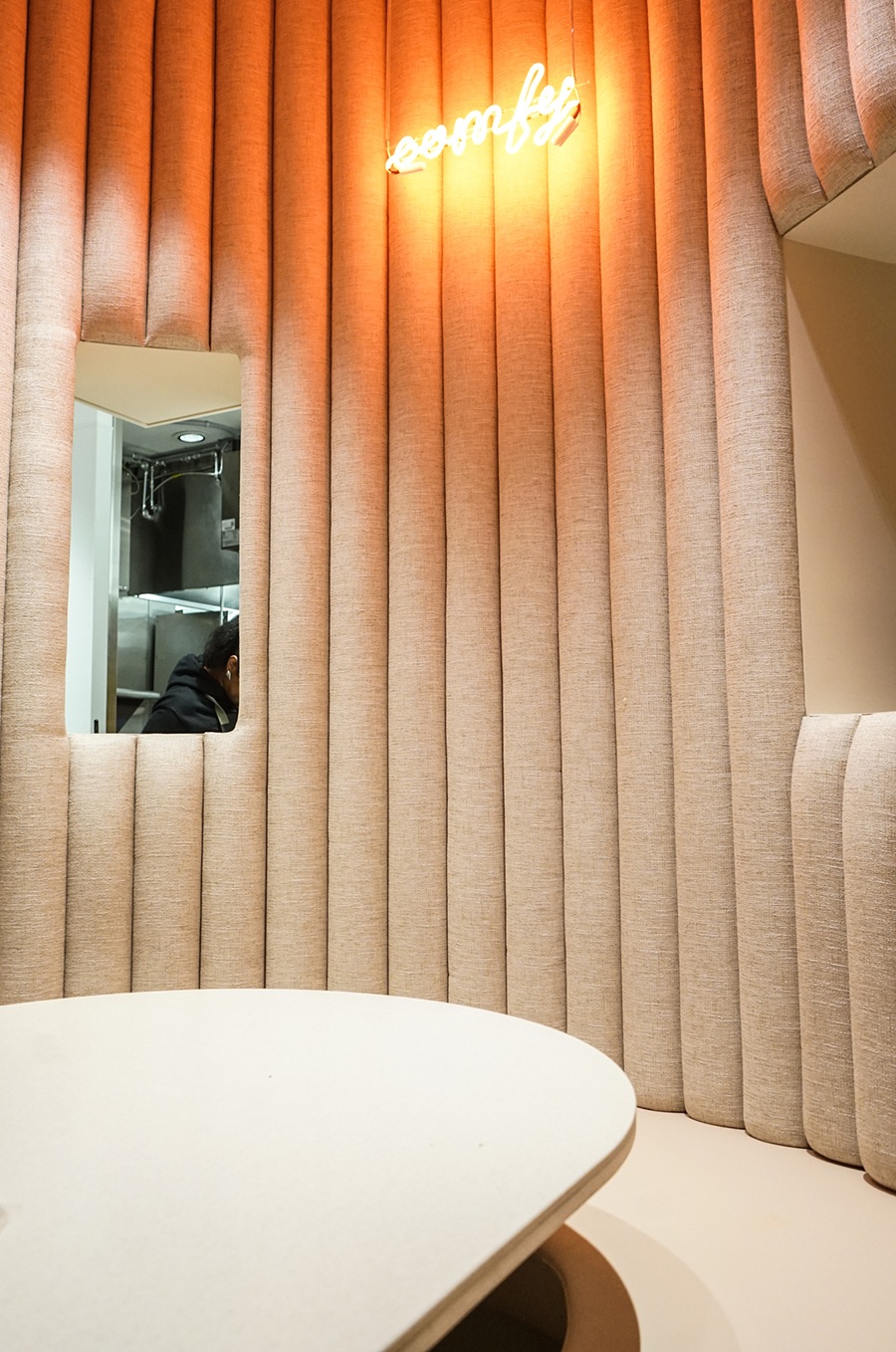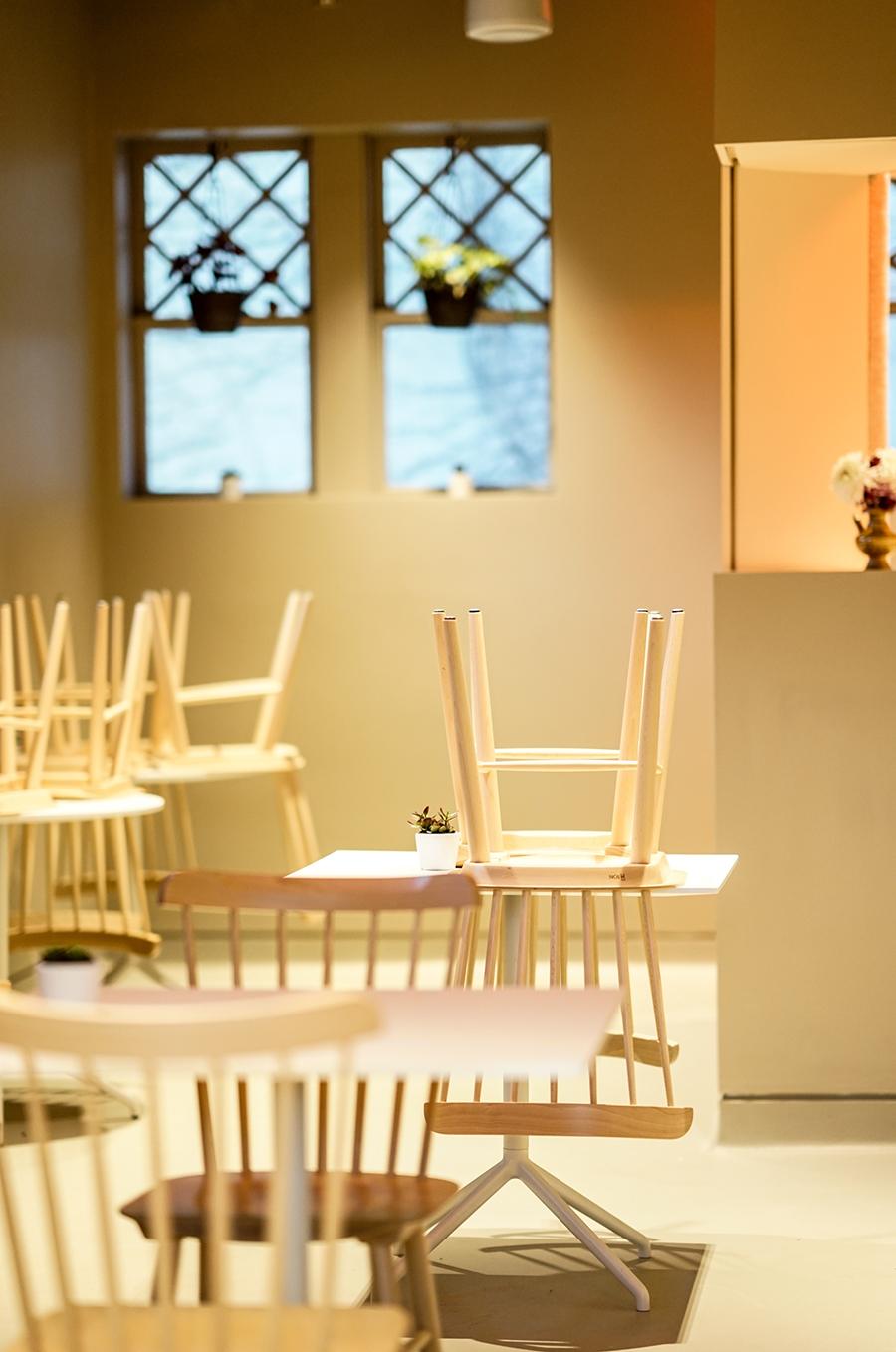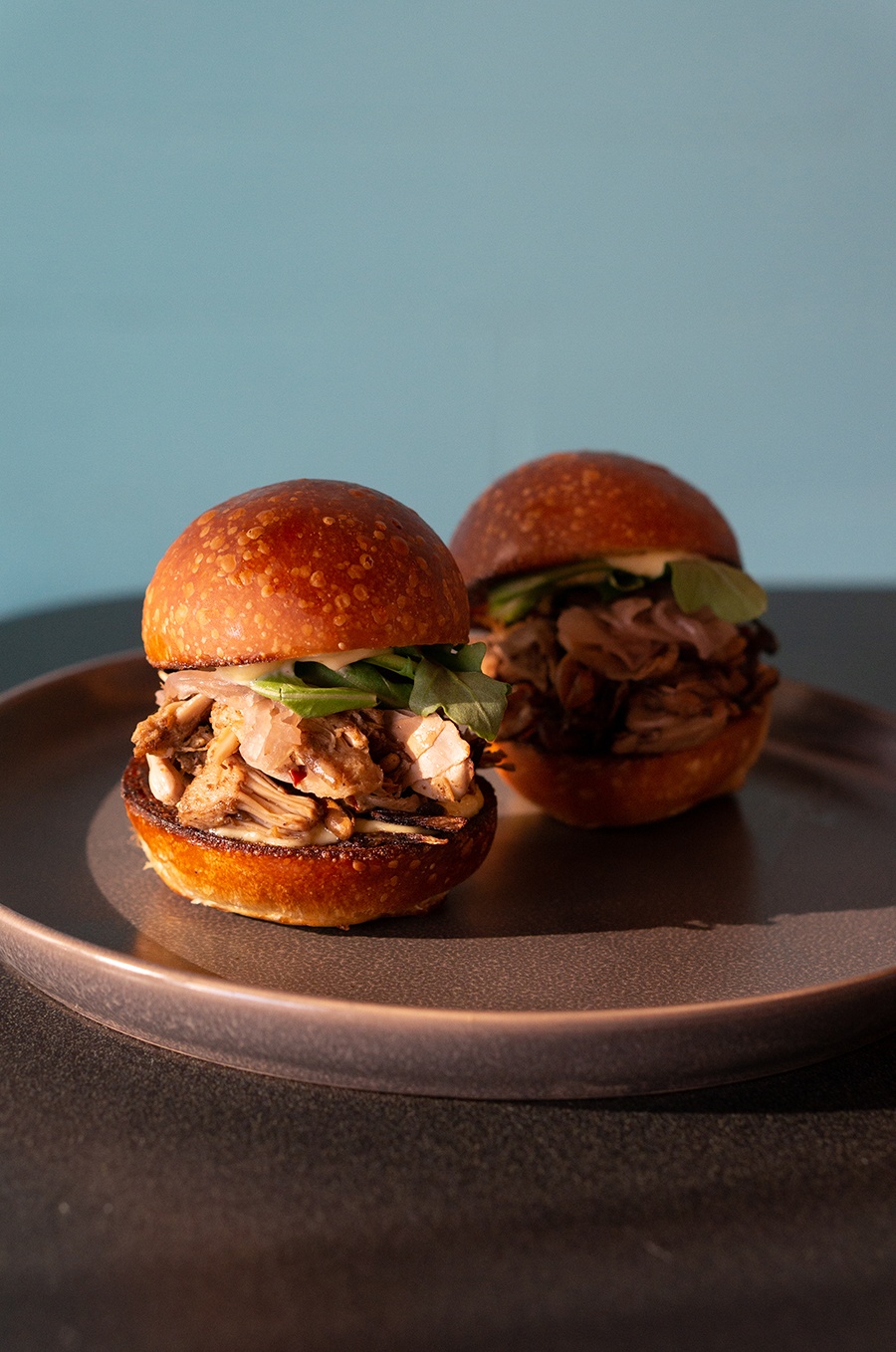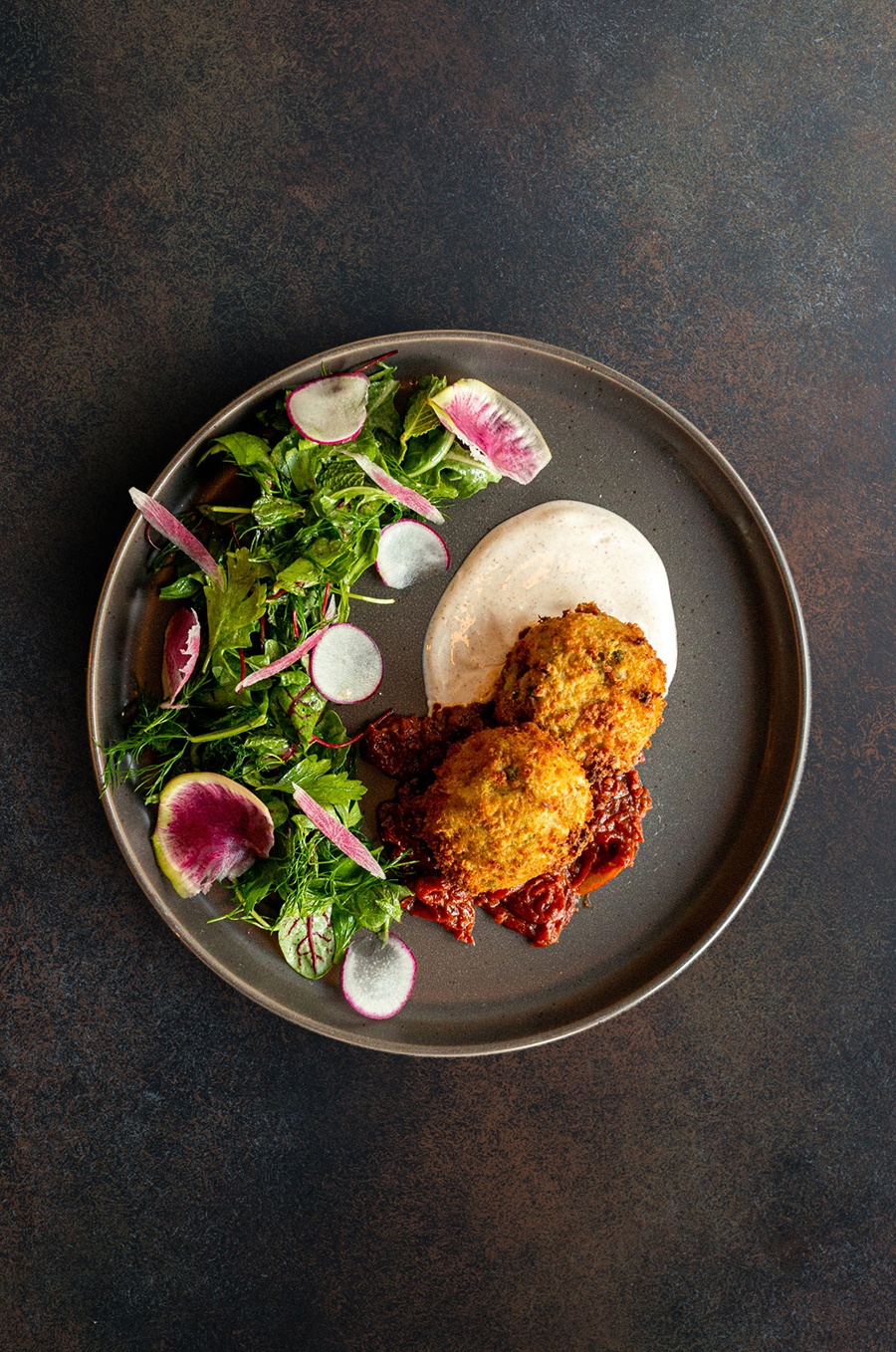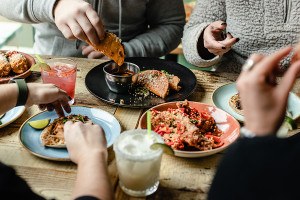Comfort Kitchen Brings Global Flavors to a Historic Dorchester Space
Celebrating ingredients of the African diaspora, the community-minded restaurant is now open in Upham’s Corner, serving café fare by day and destination-worthy dinner.
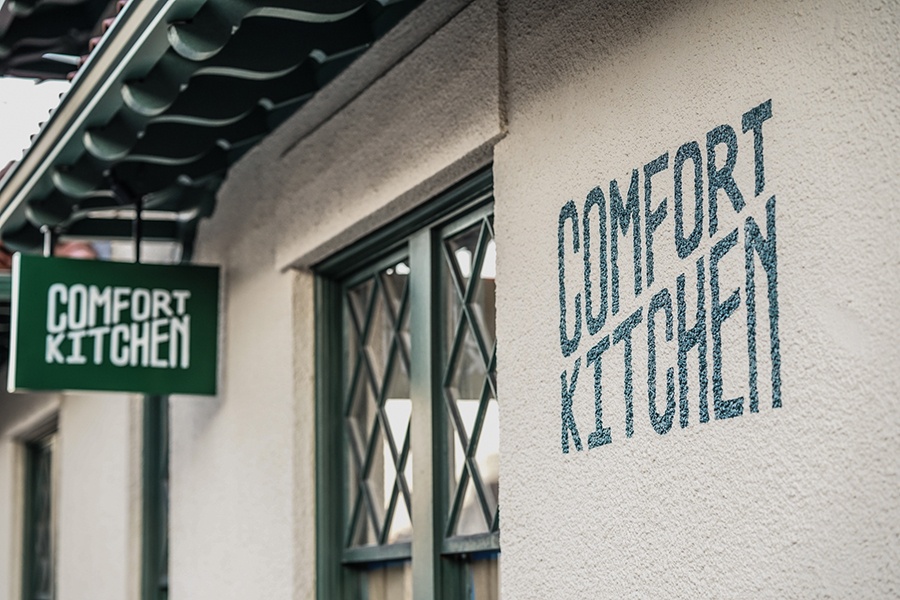
Comfort Kitchen. / Photo by Stefanie Belnavis/The Diahann Project
When the squat, one-story building at 611 Columbia Rd. was first opened in 1912, it was solely for the benefit of Bostonians. The Upham’s Corner Comfort Station, as the mission-style structure with the clay-barrel-tiled roof was known, was a public rest stop for the bustling, 20th-century Dorchester business district and Boston’s growing trolley system. But over the years, the Comfort Station’s utility faded along with the streetcar lines it served, and the building sat empty for four decades. Now, after a nearly $2 million renovation, and in the midst of grand revitalization efforts in the neighborhood, the landmark reopens as the highly anticipated new restaurant Comfort Kitchen.
Owned by restaurant industry veterans Biplaw Rai and chef Kwasi Kwaa, along with their partners, Nyacko Pearl Perry and Rita Ferreira, Comfort Kitchen is now open Monday through Saturday for counter-service tea, coffee, breakfast, and lunch, and Tuesday through Saturday for dinner with a menu that tells stories about global migration and commonalties.
Comfort Kitchen’s culinary concept
Comfort Kitchen serves breakfast sandwiches such as the Dreamer (egg, pork belly, and dill Havarti) and the Dot (egg, cheddar, arugula, and tomato jam) by day, with lunchtime options that include the Innovator (chicken, olive spread, and cabbage-carrot slaw). There are also a few grain bowls and salads. Along with locally roasted Fazenda Coffee and espresso, the beverage menu focuses on organic teas sourced from Nepali Tea Traders. “I think Boston misses out on tea because we’re so heavily a coffee city,” says Rai, who originally hails from Nepal.
For dinner, which is reservation-only to start, the menu celebrates ingredients of the African diaspora and makes cross-cultural connections, Kwaa says. Imagine dishes like seared okra with masala-spiced yogurt and a plantain crumb; jerk-roasted duck leg with rice, peas, and pikliz; and yassa chicken, a West African stew with citrus, served with cassava dumplings.
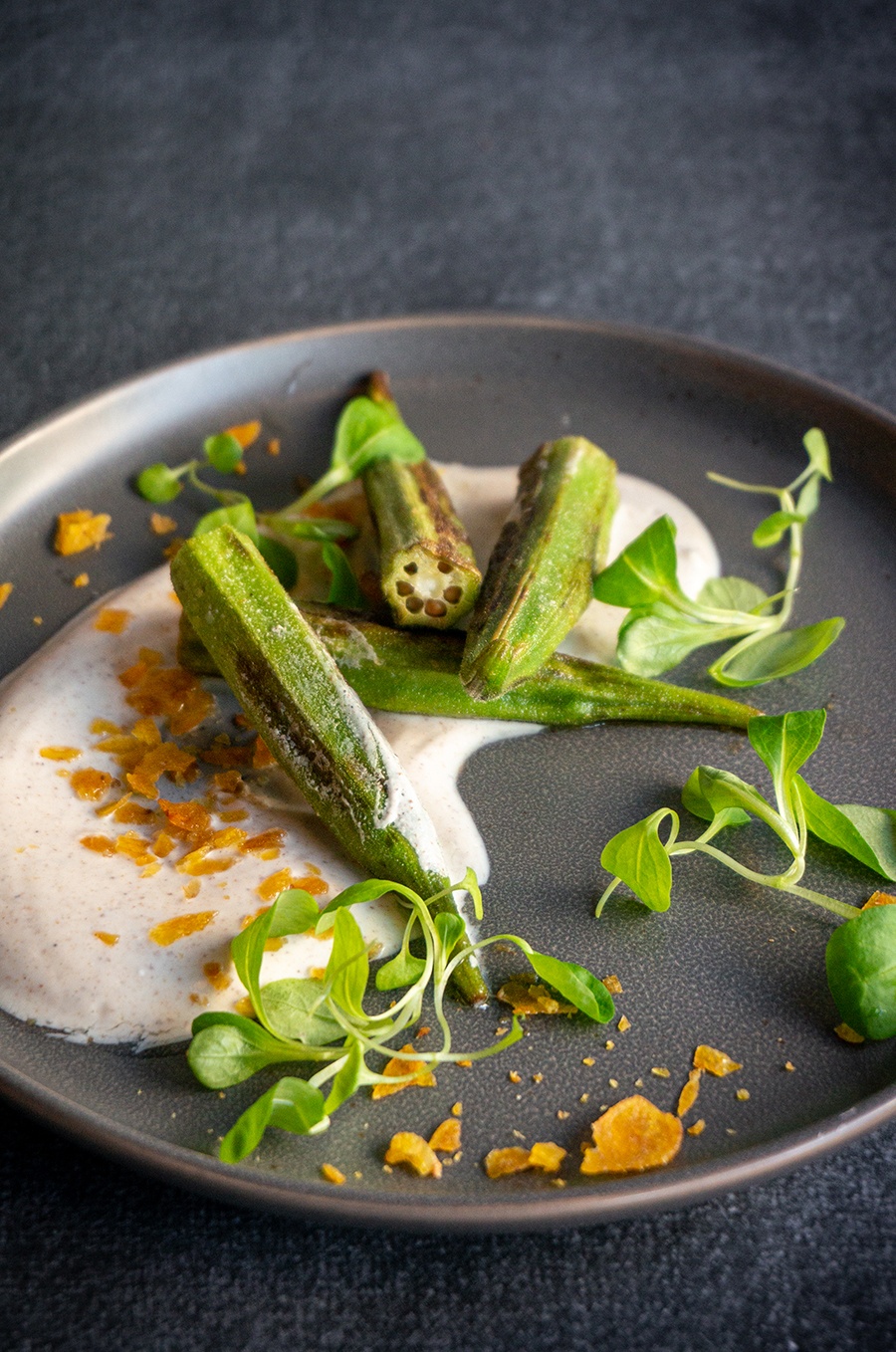
Comfort Kitchen’s seared okra with masala spiced yogurt and plantain crumb. / Photo by Rita Ferreira/Comfort Kitchen
The opening menu brings back many dishes Kwaa and chef de cuisine Shelley Nason developed for Comfort Kitchen’s pop-ups, which took place across Boston in 2020 and 2021 while the Columbia Road building was under gut-renovation. Going forward, dinner menus will change seasonally, Kwaa says, with an eye on different regions. “We’re traveling all the way from Africa through the Caribbean, through the Americas, to Asia,” he says, “just following the ingredients back and forth.”
It’s a culinary concept that Kwaa and Rai have been exploring together for more than a decade, since they first met while working together at Hi-Rise Bread Company in Cambridge. Both men are immigrants—the chef is from Ghana—and despite their varying journeys to Boston, their conversations would always come back to shared experiences and culinary intersections. “How there got to be so many similarities in different parts of the world is the focal point of the menu,” Kwaa says.
Comfort Kitchen has a full bar, and the boozy beverages take similar inspiration. Boston-based bartender Kyisha Davenport—founder of Black hospitality platform BarNoir and an alum of Tanám, Mahaniyom, and Shojo—joins Comfort Kitchen as beverage director. “Our missions are very much aligned,” Davenport says, “Black and brown diasporas and the connections between them.” She’s curating wine and beer lists featuring labels made by BIPOC producers—like McBride Sisters, the largest Black-owned wine company in the U.S.—and Boston-area breweries like Brockton Beer Co. and White Lion.
Cocktails will pull global flavors from the Comfort Kitchen pantry and beyond, Davenport says, but are still meant to feel familiar—like a house daiquiri made with Short Path Distillery’s Hibiscus Rum and a few dashes of cardamom bitters. Davenport is excited to showcase tea in some cocktails, and “of course” there’s also a take on the boozy espresso trend, she says. This version—enshrined on the menu as the Expresso Martini, in homage to Black English Vernacular—plays up the caffeinated components of the cocktail and spikes it with Haitian rum and liqueurs. “There’ll be different tributes to our respective cultures throughout the menu,” she says.
The physical space
The bar staff will be working alongside the kitchen crew, with five counter seats in the dining room overlooking their shared workspace. The restaurant has about 30 seats inside, including a curvaceous, neon-lit, pink-upholstered “comfy nook” for parties of six to eight. Local firm Supernormal worked with the Comfort Kitchen team on the interior design, which makes use of a ceiling curtain to create semi-private dining, and a pull-down projector screen for community uses.
The former Comfort Station’s cross-hatch windows, exterior stucco siding, and Spanish-style roof are all updated original designs. Historic Boston Incorporated, a non-profit developer of old commercial buildings, led the massive renovation process, which began in 2015 after the group purchased the building from the City of Boston. HBI has been a great partner to Comfort Kitchen, Rai says, and a provision of their agreement gives the restaurateurs the option to buy the building within seven years. “That’s a huge part for us,” Rai says.
The standalone structure (which abuts the Dorchester North Burying Ground, established 1634) boasts off-street patios on both sides. About 15 outdoor seats are on the terrace at the main entrance, with an additional 25 or so on the back patio, which will be available to rent for events. An outdoor sculpture was made by Nora Valdez, one of several artists based at nearby Humphreys Street Studios, with whom Comfort Kitchen collaborated on art for the restaurant.
The overall vision
The design of the business itself, meanwhile, is the partners’ shared vision for improving what Rai calls the “broken industry” they came up in. Another recurring conversation from those early Hi-Rise Bread days was how Rai and Kwaa would do things differently if they owned a restaurant. “I think the pandemic has helped folks understand the cost and what it takes to actually operate a food business,” Kwaa says, but “we used to talk about it in 2015.”
Comfort Kitchen is starting café staff wages at $17 plus tips, Rai shares. Kitchen workers, who are all cross-trained on service, are making $18 to $22 an hour plus a percentage of a 5% fee charged to customers. There are also a handful of salaried employees within the company. The team has hired about a dozen people so far, out of an anticipated 20 employees, including some longtime colleagues, like Nason, a former corporate catering coworker with whom Kwaa launched his pre-Comfort Kitchen pop-up, the Chop Bar.
The dual concept of a café-by-day and destination-worthy dinner helps to make the math work, Rai says, and it also befits the neighborhood. Upham’s Corner is an ungentrified square located in one of the most densely populated and diverse parts of Boston, where he and his family also live. Perry, Rai’s wife and Comfort Kitchen’s organizational development partner, is also an equity, diversity, and inclusion consultant who has been instrumental in establishing the internal business structures with equity at the center, work that aligns with efforts to revitalize the neighborhood as an official arts and innovation district.
As business owners “on the cutting edge” of a changing neighborhood, “we are very conscious about who our neighbors are,” Rai says, noting the income disparity on either side of Columbia Road. The daytime menu is designed to be accessible to people who are more accustomed to fast-food prices, he says, albeit commensurate with high-quality ingredients. For dinner, the cost is higher to reflect the chefs’ curated menus and the more elevated dining experience.
Rai recalls a workshop the partners participated in which asked neighbors what they wanted in the area. “The number one thing was a space to sit down and eat,” he says. When Comfort Kitchen launched a MainVest campaign to raise $100,000, 120 small-scale investors helped meet the goal in just a few weeks. It was an encouraging message, Rai says, that “we all want to do the same thing.”
In other words, Comfort Kitchen is a public amenity for today’s bustling Boston.
611 Columbia Rd., Dorchester, Boston, 617-329-6910, comfortkitchenbos.com.

